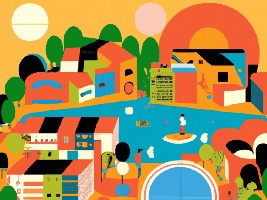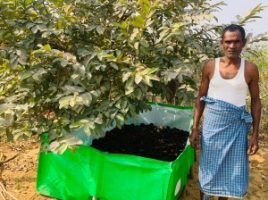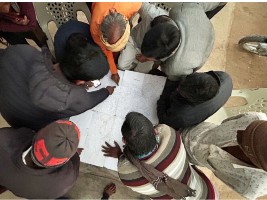Technology Innovation – Disruptive Technologies for South-South Cooperation

Workers at a traditional brick kiln in East London, South Africa
There has been a wide variation in the definition of ‘technology Innovation’. Going by theory, technology innovation is the process of developing a new process or a new product that alters the dimensions of our lives by bringing in disruptive changes in the way we do our work. Various constituents define ‘technology innovation’ as their own way of preference. An academic institution defines it as a disruptive product or process of producing a product. An engineering company will define technology innovation as a product or a process that improves the profitability of the company. The service sector defines it as an innovation that brings in a systematic change in people’s lives.
At Technology and Action for Rural Advancement, we believe in technology innovation as the ‘profitable implementation of creative ideas’. This not only changes the work that we do but also the very dimensions of our lives. We believe that innovations must be creative to bring about a disruptive change in everybody’s life and it must be profitable. At TARA, we develop technologies for both scaling up and scaling out to ensure that the benefits reaches across the planet. If a product that is developed is not cheaper than the conventional product available in the market then it will not be accepted, and the innovation will remain in scientific journals. This theory is the backbone of our belief at TARA, and we strive on ‘there is a little bit of TARA in the lives of rural India’.
TARA works in three areas of innovation:
- Product innovation: Emerges from the need to develop a new product assisted by the rapidly changing technologies of the world.
- Technology innovation: Emerges from the rapidly changing environment of manufacturing the product, mainly looking at how to deliver it at scale in a lesser amount of time and at an affordable cost.
- Value innovation: Increasing the value of a product or service in the search for a new un-tapped market.
For example, the most important value innovation of the decade is the services provided by Uber, Ola, Swiggy, Zomato, Groww or similar companies. These companies do not own any materials or capital but aggregate services and provide value to customers by improving the ease of doing business, including improving their lives.
TARA was set up in 1985 with the idea of exploring the interface between technology and people. Thus, most of the work we do involves close association with people. Over the past couple of decades, our focus on technology innovation has primarily been to benefit the people and planet across the world and not limiting only to India. Thus, our technology and technology development initiative is based on the following axioms:
- Climate friendly: Technologies that we develop must save greenhouse gas emissions so that our future can breathe a healthy life.
- Resource efficient: Our products are based on the use of waste materials so that the impact on virgin natural resources is minimised.
- Resource efficient: Our products are based on the use of waste materials so that the impact on virgin natural resources is minimised.
- Create jobs and enterprises: Our technologies create jobs and enterprises across the value chain that are decent and provide dignity to people’s lives. Thus, these enterprises operate throughout the year in a socially just way, providing jobs and decent income security.
- Socially acceptable and relevant: Our technologies produce products that are not futuristic but relate to the market and where there is a demand for the same.
- Profitable and affordable: All our products are affordable compared to similar products available in the market, and the technologies used to produce them have a bankable rate of return.
At Technology and Action for Rural Advancement, through a span of four decades, we have developed a repository of more than 40 technologies that cater to the needs of both SMEs and large companies. Most of our technologies are based on creating Wealth from Waste with a primary focus on their large-scale utilisation. Some of the flagship technologies are the use of stone crusher dust in building materials, e.g. Micro Concrete Roofing Tiles, Paving Blocks, Door and Window Frames, Kerb Stones, Planks and Joists, Floor Tiles and a wide range of other products. These are durable, use waste and can be customised based on designs and requirements. Technologies have been developed to produce walling and flooring building materials from construction and demolition wastes, sandstone dust, marble dust, kota stone dust waste and other varieties of wastes. Products have strengths of more than 80 MPa based on the need and can be used in both structural and non-structural applications. To reduce the use of fossil fuels, technologies have been commercially developed and disseminated for producing pellets and briquettes from waste biomass, municipal solid wastes, packaging wastes, plastic and paper wastes. These can help partially replace coal as a fuel in all types of thermal applications, ranging from commercial cooking to cement plants to thermal power plants.
The views expressed in the article are those of the authors and not necessarily those of Development Alternatives.
This blog first appeared as an editorial in Development Alternatives Newsletter April, 2024 https://devalt.org/newsletter/43






Leave a Reply